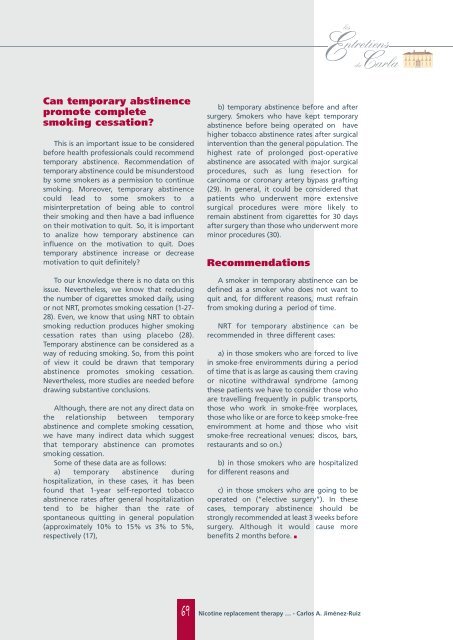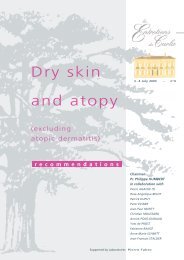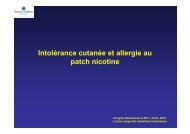Nicotine replacement therapy … - Carlos A ... - Entretiens du Carla
Nicotine replacement therapy … - Carlos A ... - Entretiens du Carla
Nicotine replacement therapy … - Carlos A ... - Entretiens du Carla
Create successful ePaper yourself
Turn your PDF publications into a flip-book with our unique Google optimized e-Paper software.
Can temporary abstinence<br />
promote complete<br />
smoking cessation?<br />
This is an important issue to be considered<br />
before health professionals could recommend<br />
temporary abstinence. Recommendation of<br />
temporary abstinence could be misunderstood<br />
by some smokers as a permission to continue<br />
smoking. Moreover, temporary abstinence<br />
could lead to some smokers to a<br />
misinterpretation of being able to control<br />
their smoking and then have a bad influence<br />
on their motivation to quit. So, it is important<br />
to analize how temporary abstinence can<br />
influence on the motivation to quit. Does<br />
temporary abstinence increase or decrease<br />
motivation to quit definitely?<br />
To our knowledge there is no data on this<br />
issue. Nevertheless, we know that re<strong>du</strong>cing<br />
the number of cigarettes smoked daily, using<br />
or not NRT, promotes smoking cessation (1-27-<br />
28). Even, we know that using NRT to obtain<br />
smoking re<strong>du</strong>ction pro<strong>du</strong>ces higher smoking<br />
cessation rates than using placebo (28).<br />
Temporary abstinence can be considered as a<br />
way of re<strong>du</strong>cing smoking. So, from this point<br />
of view it could be drawn that temporary<br />
abstinence promotes smoking cessation.<br />
Nevertheless, more studies are needed before<br />
drawing substantive conclusions.<br />
Although, there are not any direct data on<br />
the relationship between temporary<br />
abstinence and complete smoking cessation,<br />
we have many indirect data which suggest<br />
that temporary abstinence can promotes<br />
smoking cessation.<br />
Some of these data are as follows:<br />
a) temporary abstinence <strong>du</strong>ring<br />
hospitalization, in these cases, it has been<br />
found that 1-year self-reported tobacco<br />
abstinence rates after general hospitalization<br />
tend to be higher than the rate of<br />
spontaneous quitting in general population<br />
(approximately 10% to 15% vs 3% to 5%,<br />
respectively (17),<br />
b) temporary abstinence before and after<br />
surgery. Smokers who have kept temporary<br />
abstinence before being operated on have<br />
higher tobacco abstinence rates after surgical<br />
intervention than the general population. The<br />
highest rate of prolonged post-operative<br />
abstinence are assocated with major surgical<br />
proce<strong>du</strong>res, such as lung resection for<br />
carcinoma or coronary artery bypass grafting<br />
(29). In general, it could be considered that<br />
patients who underwent more extensive<br />
surgical proce<strong>du</strong>res were more likely to<br />
remain abstinent from cigarettes for 30 days<br />
after surgery than those who underwent more<br />
minor proce<strong>du</strong>res (30).<br />
Recommendations<br />
A smoker in temporary abstinence can be<br />
defined as a smoker who does not want to<br />
quit and, for different reasons, must refrain<br />
from smoking <strong>du</strong>ring a period of time.<br />
NRT for temporary abstinence can be<br />
recommended in three different cases:<br />
a) in those smokers who are forced to live<br />
in smoke-free enviromments <strong>du</strong>ring a period<br />
of time that is as large as causing them craving<br />
or nicotine withdrawal syndrome (among<br />
these patients we have to consider those who<br />
are travelling frequently in public transports,<br />
those who work in smoke-free worplaces,<br />
those who like or are force to keep smoke-free<br />
enviromment at home and those who visit<br />
smoke-free recreational venues: discos, bars,<br />
restaurants and so on.)<br />
b) in those smokers who are hospitalized<br />
for different reasons and<br />
c) in those smokers who are going to be<br />
operated on (“elective surgery”). In these<br />
cases, temporary abstinence should be<br />
strongly recommended at least 3 weeks before<br />
surgery. Although it would cause more<br />
benefits 2 months before. ■<br />
69 <strong>Nicotine</strong> <strong>replacement</strong> <strong>therapy</strong> … - <strong>Carlos</strong> A. Jiménez-Ruiz






